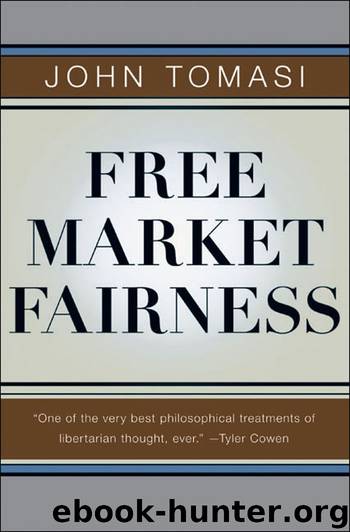Free Market Fairness by Tomasi John

Author:Tomasi, John
Language: eng
Format: epub
ISBN: 9781400842391
Publisher: Princeton University Press
Applying the Theory
As I have stated, I think of market democracy as a research program rather than as any one particular view. As a research program, a great variety of different liberal views might be developed within a broadly market democratic framework. For example, while affirming a thick conception of private economic liberties as basic rights, market democracy leaves room for disagreement about the precise content of those basic economic liberties. Similarly, while all liberals assign special weight to basic rights when they conflict with other social values, market democracy allows for a range of reasonable disagreement about just how strictly the priority given to basic rights should be understood.
Market democracy breaks with traditional classical liberal and libertarian traditions in founding politics on a deliberative ideal of democratic citizenship. However, as even our brief account of Gaus’s work makes plain, market democracy makes room for a variety of rival conceptions of the nature of public reason. It thus also makes room for rival accounts of the justificatory conditions that must be satisfied if a society is to be just and legitimate. Closely related, arguments that seek to combine economic liberty and social justice might be presented at a variety of argumentative levels. Some defenses, worked out primarily at the level I call political theory, might be closely concerned with empirical claims about how rival institutions are likely to function in practice. Other such arguments, worked at the level I call political philosophy, might abstract further away from such practical questions and focus more on the quality of the regime’s moral intentions (with questions about the practical likelihood of such regime’s actually realizing its intentions being bracketed to some significant degree).
More dramatically, I believe it might be possible to adjust and develop whole schools of left liberal social justice in a market democratic direction. The institutional proposals of policy analyst Charles Murray, as we have seen, appear to be motivated not merely by concerns of practical expediency but by a deeper commitment to some version or other of “luck egalitarianism” (admittedly, only very roughly described in Murray’s work). It would be interesting to see how a political philosopher who shared Murray’s sense of the moral importance of private economic freedom and Murray’s intuition that in some sense morally just distributions are ones that emerge more from people’s choices than from brute luck might work up a full theory from those ideas. Or, to take a very different approach, it would be interesting to see what some market democratic version of the “capabilities approach” might look like. Margaret Holmgren says that people have a fundamental interest in advancing through their own efforts. This claim about the moral importance of personal economic autonomy likely would ring true for many of the women in developing countries to whom leading capabilities theorists such as Martha Nussbaum devote much attention. Could such an interest be built up in such a way that gained it a central place on the list of the basic human capabilities? How
Download
This site does not store any files on its server. We only index and link to content provided by other sites. Please contact the content providers to delete copyright contents if any and email us, we'll remove relevant links or contents immediately.
| Anarchism | Communism & Socialism |
| Conservatism & Liberalism | Democracy |
| Fascism | Libertarianism |
| Nationalism | Radicalism |
| Utopian |
The Secret History by Donna Tartt(19085)
The Social Justice Warrior Handbook by Lisa De Pasquale(12190)
Thirteen Reasons Why by Jay Asher(8909)
This Is How You Lose Her by Junot Diaz(6885)
Weapons of Math Destruction by Cathy O'Neil(6279)
Zero to One by Peter Thiel(5801)
Beartown by Fredrik Backman(5751)
The Myth of the Strong Leader by Archie Brown(5507)
The Fire Next Time by James Baldwin(5442)
How Democracies Die by Steven Levitsky & Daniel Ziblatt(5218)
Promise Me, Dad by Joe Biden(5153)
Stone's Rules by Roger Stone(5087)
A Higher Loyalty: Truth, Lies, and Leadership by James Comey(4960)
100 Deadly Skills by Clint Emerson(4924)
Rise and Kill First by Ronen Bergman(4788)
Secrecy World by Jake Bernstein(4752)
The David Icke Guide to the Global Conspiracy (and how to end it) by David Icke(4717)
The Farm by Tom Rob Smith(4507)
The Doomsday Machine by Daniel Ellsberg(4490)
